Analyzing Democratic Peace Theory in International Relations
VerifiedAdded on 2023/06/07
|5
|809
|360
Essay
AI Summary
This essay examines the democratic peace theory, focusing on its role in promoting cooperation and maintaining peace in international relations. It discusses how the theory, rooted in principles of democratization, transparency, and cooperation, enhances relationships between countries and helps prevent conflicts. The essay further explores the theory's impact on the balance of power, highlighting how it encourages cooperation and protects resources. It concludes that the democratic peace theory is essential for minimizing conflicts and fostering understanding among nations, making this essay a valuable resource for students. Desklib offers a wealth of similar solved assignments and study resources.
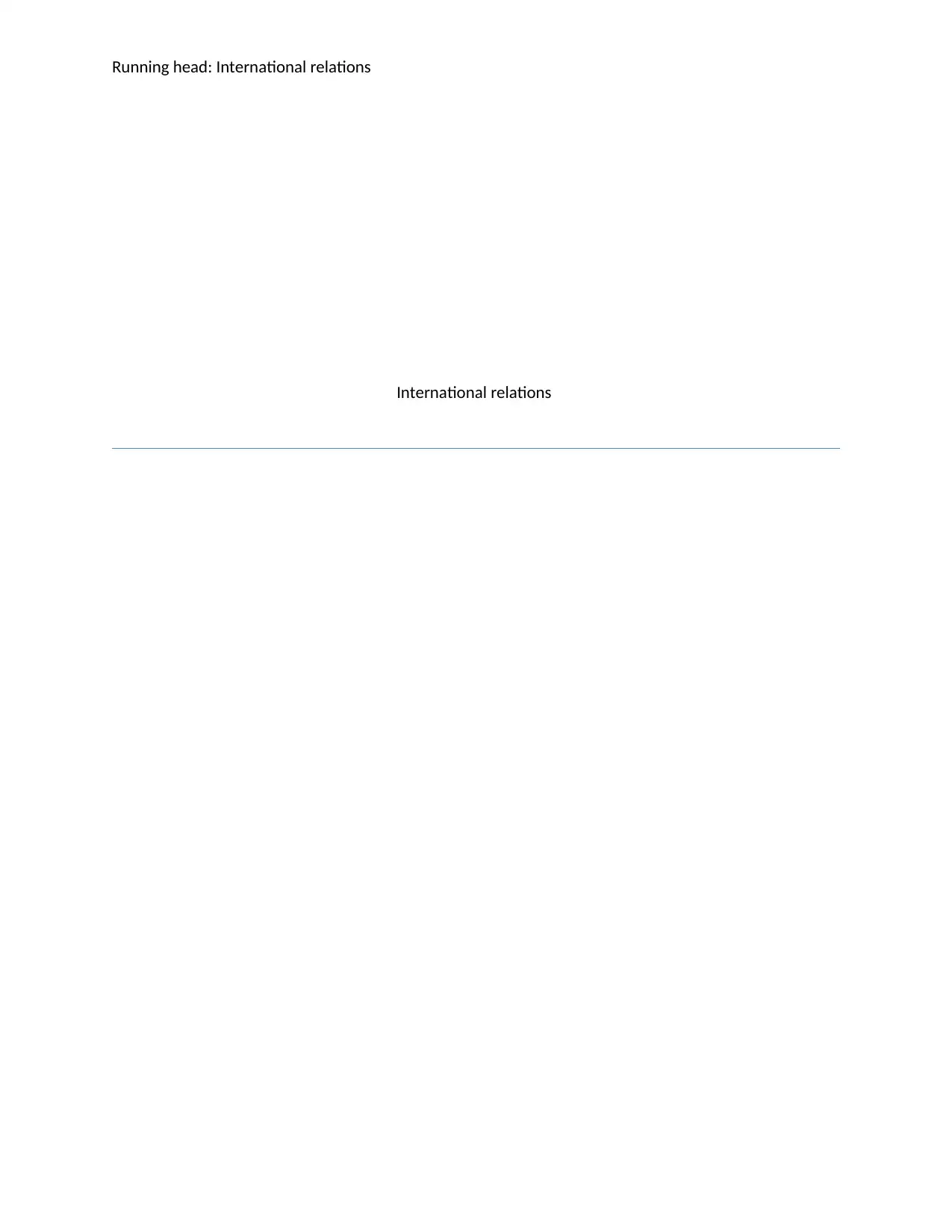
Running head: International relations
International relations
International relations
Paraphrase This Document
Need a fresh take? Get an instant paraphrase of this document with our AI Paraphraser
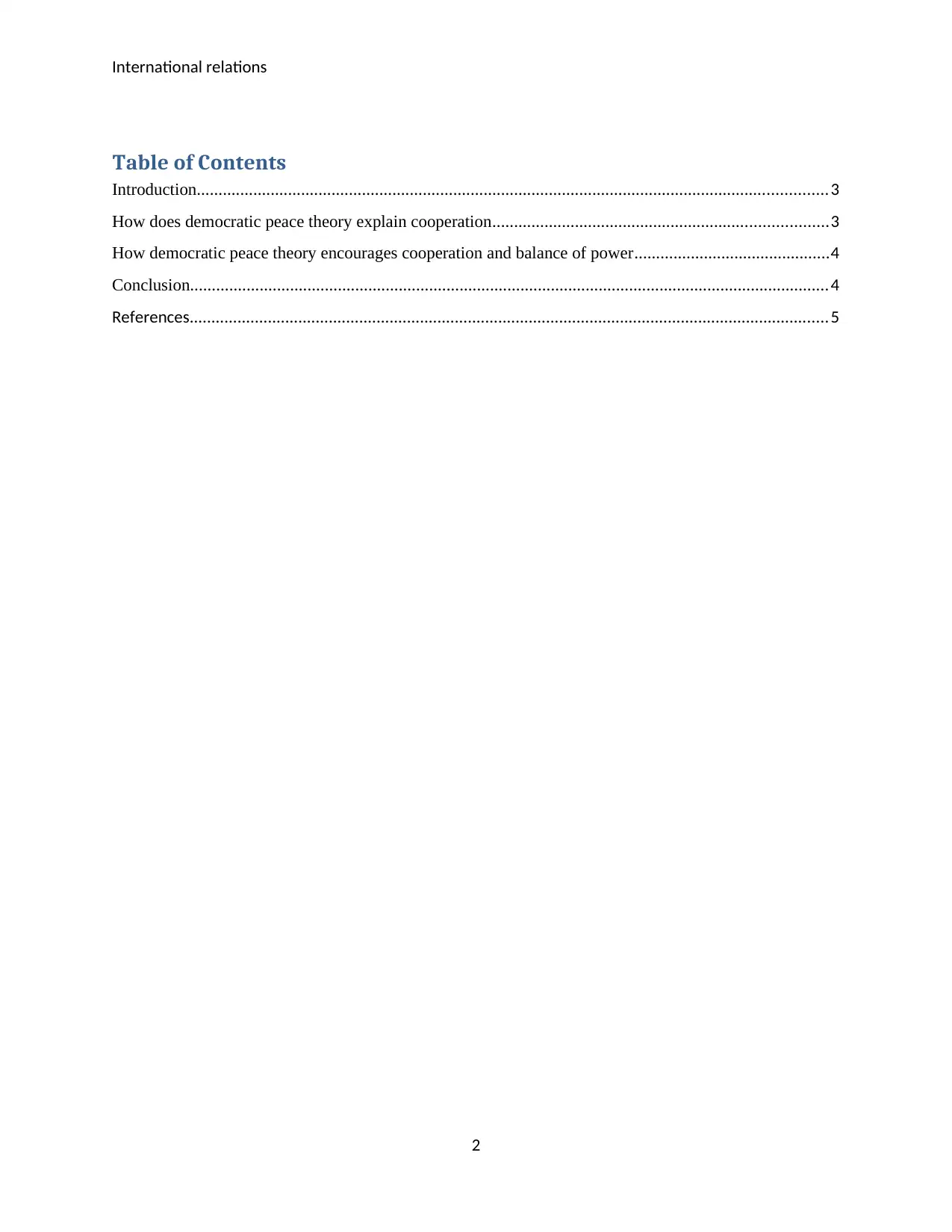
International relations
Table of Contents
Introduction.................................................................................................................................................3
How does democratic peace theory explain cooperation.............................................................................3
How democratic peace theory encourages cooperation and balance of power.............................................4
Conclusion...................................................................................................................................................4
References...................................................................................................................................................5
2
Table of Contents
Introduction.................................................................................................................................................3
How does democratic peace theory explain cooperation.............................................................................3
How democratic peace theory encourages cooperation and balance of power.............................................4
Conclusion...................................................................................................................................................4
References...................................................................................................................................................5
2
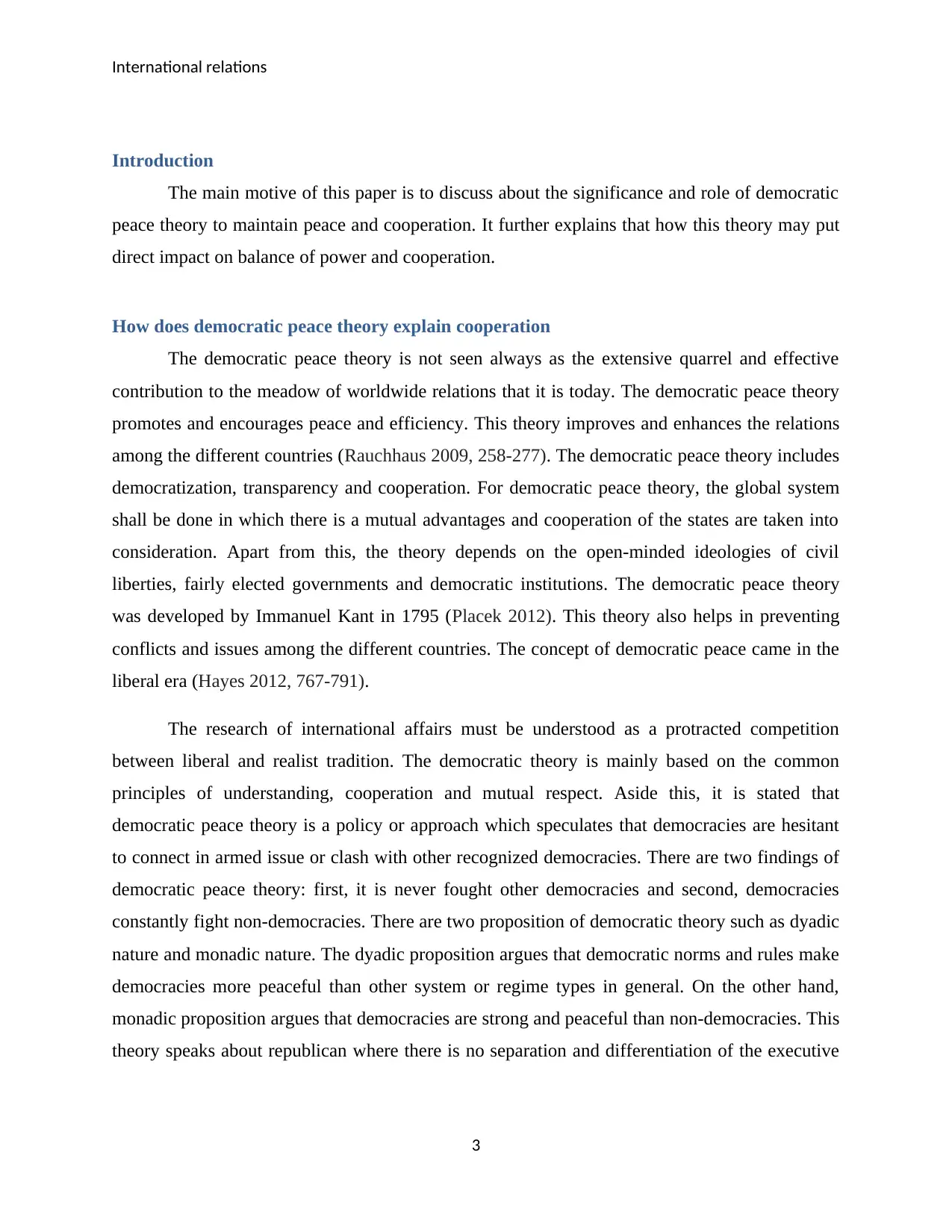
International relations
Introduction
The main motive of this paper is to discuss about the significance and role of democratic
peace theory to maintain peace and cooperation. It further explains that how this theory may put
direct impact on balance of power and cooperation.
How does democratic peace theory explain cooperation
The democratic peace theory is not seen always as the extensive quarrel and effective
contribution to the meadow of worldwide relations that it is today. The democratic peace theory
promotes and encourages peace and efficiency. This theory improves and enhances the relations
among the different countries (Rauchhaus 2009, 258-277). The democratic peace theory includes
democratization, transparency and cooperation. For democratic peace theory, the global system
shall be done in which there is a mutual advantages and cooperation of the states are taken into
consideration. Apart from this, the theory depends on the open-minded ideologies of civil
liberties, fairly elected governments and democratic institutions. The democratic peace theory
was developed by Immanuel Kant in 1795 (Placek 2012). This theory also helps in preventing
conflicts and issues among the different countries. The concept of democratic peace came in the
liberal era (Hayes 2012, 767-791).
The research of international affairs must be understood as a protracted competition
between liberal and realist tradition. The democratic theory is mainly based on the common
principles of understanding, cooperation and mutual respect. Aside this, it is stated that
democratic peace theory is a policy or approach which speculates that democracies are hesitant
to connect in armed issue or clash with other recognized democracies. There are two findings of
democratic peace theory: first, it is never fought other democracies and second, democracies
constantly fight non-democracies. There are two proposition of democratic theory such as dyadic
nature and monadic nature. The dyadic proposition argues that democratic norms and rules make
democracies more peaceful than other system or regime types in general. On the other hand,
monadic proposition argues that democracies are strong and peaceful than non-democracies. This
theory speaks about republican where there is no separation and differentiation of the executive
3
Introduction
The main motive of this paper is to discuss about the significance and role of democratic
peace theory to maintain peace and cooperation. It further explains that how this theory may put
direct impact on balance of power and cooperation.
How does democratic peace theory explain cooperation
The democratic peace theory is not seen always as the extensive quarrel and effective
contribution to the meadow of worldwide relations that it is today. The democratic peace theory
promotes and encourages peace and efficiency. This theory improves and enhances the relations
among the different countries (Rauchhaus 2009, 258-277). The democratic peace theory includes
democratization, transparency and cooperation. For democratic peace theory, the global system
shall be done in which there is a mutual advantages and cooperation of the states are taken into
consideration. Apart from this, the theory depends on the open-minded ideologies of civil
liberties, fairly elected governments and democratic institutions. The democratic peace theory
was developed by Immanuel Kant in 1795 (Placek 2012). This theory also helps in preventing
conflicts and issues among the different countries. The concept of democratic peace came in the
liberal era (Hayes 2012, 767-791).
The research of international affairs must be understood as a protracted competition
between liberal and realist tradition. The democratic theory is mainly based on the common
principles of understanding, cooperation and mutual respect. Aside this, it is stated that
democratic peace theory is a policy or approach which speculates that democracies are hesitant
to connect in armed issue or clash with other recognized democracies. There are two findings of
democratic peace theory: first, it is never fought other democracies and second, democracies
constantly fight non-democracies. There are two proposition of democratic theory such as dyadic
nature and monadic nature. The dyadic proposition argues that democratic norms and rules make
democracies more peaceful than other system or regime types in general. On the other hand,
monadic proposition argues that democracies are strong and peaceful than non-democracies. This
theory speaks about republican where there is no separation and differentiation of the executive
3
⊘ This is a preview!⊘
Do you want full access?
Subscribe today to unlock all pages.

Trusted by 1+ million students worldwide
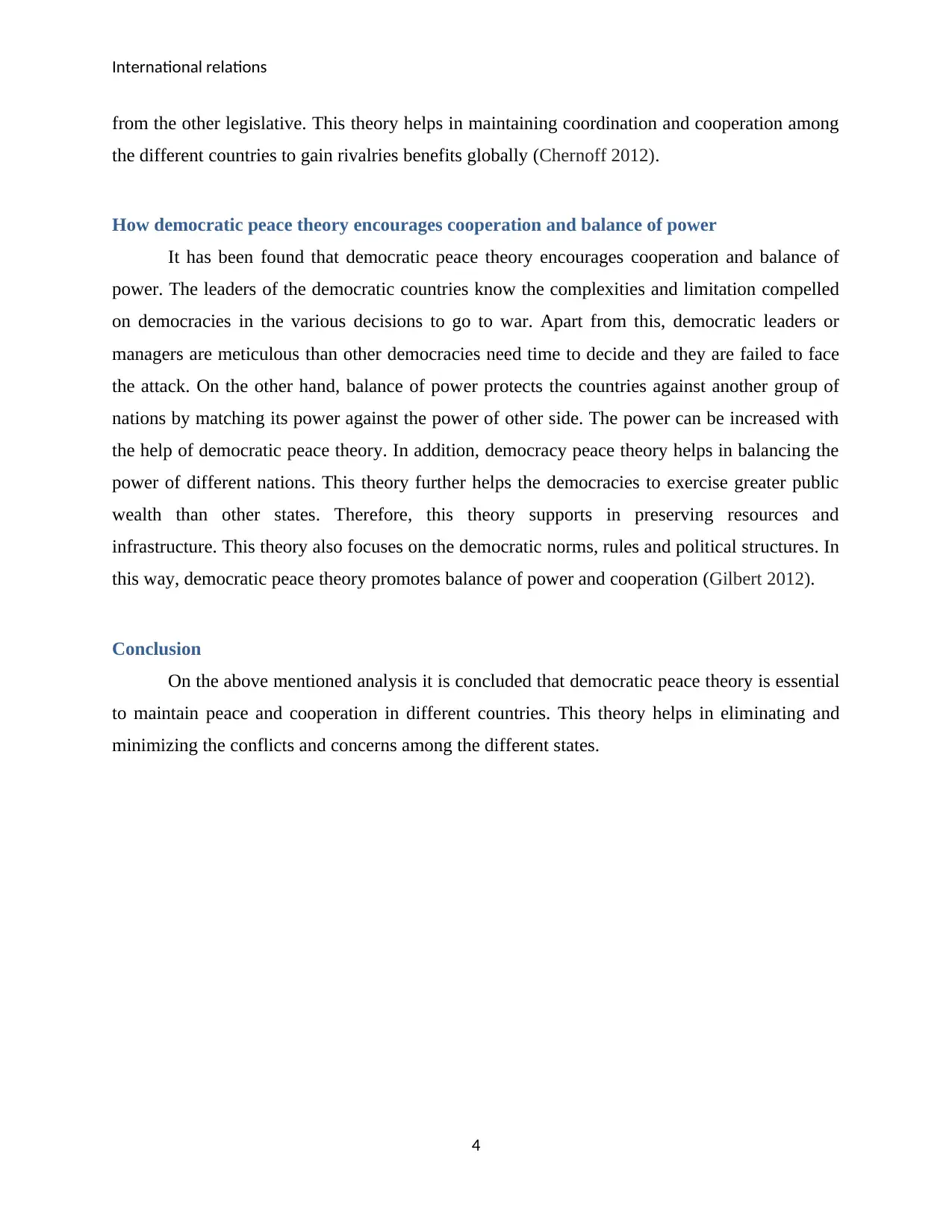
International relations
from the other legislative. This theory helps in maintaining coordination and cooperation among
the different countries to gain rivalries benefits globally (Chernoff 2012).
How democratic peace theory encourages cooperation and balance of power
It has been found that democratic peace theory encourages cooperation and balance of
power. The leaders of the democratic countries know the complexities and limitation compelled
on democracies in the various decisions to go to war. Apart from this, democratic leaders or
managers are meticulous than other democracies need time to decide and they are failed to face
the attack. On the other hand, balance of power protects the countries against another group of
nations by matching its power against the power of other side. The power can be increased with
the help of democratic peace theory. In addition, democracy peace theory helps in balancing the
power of different nations. This theory further helps the democracies to exercise greater public
wealth than other states. Therefore, this theory supports in preserving resources and
infrastructure. This theory also focuses on the democratic norms, rules and political structures. In
this way, democratic peace theory promotes balance of power and cooperation (Gilbert 2012).
Conclusion
On the above mentioned analysis it is concluded that democratic peace theory is essential
to maintain peace and cooperation in different countries. This theory helps in eliminating and
minimizing the conflicts and concerns among the different states.
4
from the other legislative. This theory helps in maintaining coordination and cooperation among
the different countries to gain rivalries benefits globally (Chernoff 2012).
How democratic peace theory encourages cooperation and balance of power
It has been found that democratic peace theory encourages cooperation and balance of
power. The leaders of the democratic countries know the complexities and limitation compelled
on democracies in the various decisions to go to war. Apart from this, democratic leaders or
managers are meticulous than other democracies need time to decide and they are failed to face
the attack. On the other hand, balance of power protects the countries against another group of
nations by matching its power against the power of other side. The power can be increased with
the help of democratic peace theory. In addition, democracy peace theory helps in balancing the
power of different nations. This theory further helps the democracies to exercise greater public
wealth than other states. Therefore, this theory supports in preserving resources and
infrastructure. This theory also focuses on the democratic norms, rules and political structures. In
this way, democratic peace theory promotes balance of power and cooperation (Gilbert 2012).
Conclusion
On the above mentioned analysis it is concluded that democratic peace theory is essential
to maintain peace and cooperation in different countries. This theory helps in eliminating and
minimizing the conflicts and concerns among the different states.
4
Paraphrase This Document
Need a fresh take? Get an instant paraphrase of this document with our AI Paraphraser
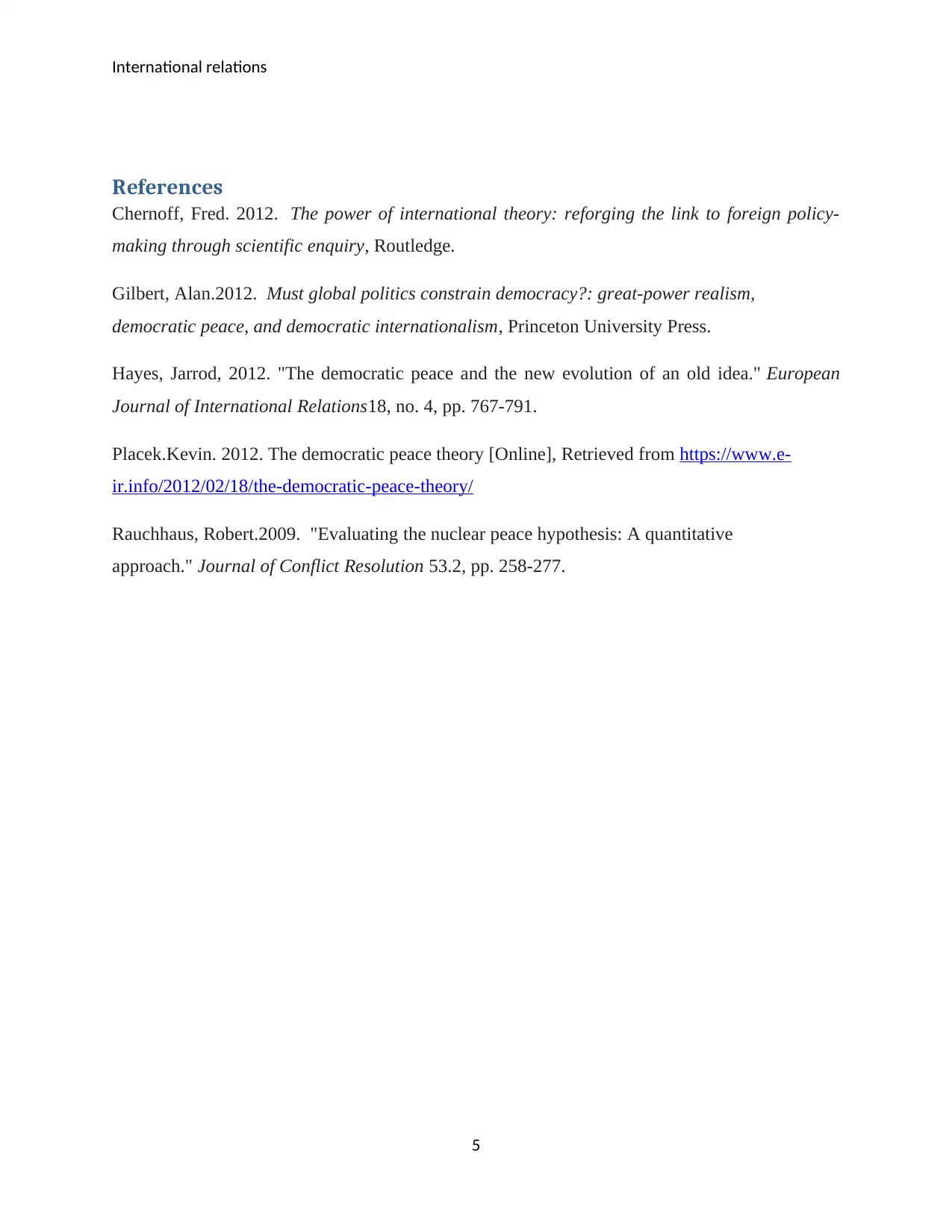
International relations
References
Chernoff, Fred. 2012. The power of international theory: reforging the link to foreign policy-
making through scientific enquiry, Routledge.
Gilbert, Alan.2012. Must global politics constrain democracy?: great-power realism,
democratic peace, and democratic internationalism, Princeton University Press.
Hayes, Jarrod, 2012. "The democratic peace and the new evolution of an old idea." European
Journal of International Relations18, no. 4, pp. 767-791.
Placek.Kevin. 2012. The democratic peace theory [Online], Retrieved from https://www.e-
ir.info/2012/02/18/the-democratic-peace-theory/
Rauchhaus, Robert.2009. "Evaluating the nuclear peace hypothesis: A quantitative
approach." Journal of Conflict Resolution 53.2, pp. 258-277.
5
References
Chernoff, Fred. 2012. The power of international theory: reforging the link to foreign policy-
making through scientific enquiry, Routledge.
Gilbert, Alan.2012. Must global politics constrain democracy?: great-power realism,
democratic peace, and democratic internationalism, Princeton University Press.
Hayes, Jarrod, 2012. "The democratic peace and the new evolution of an old idea." European
Journal of International Relations18, no. 4, pp. 767-791.
Placek.Kevin. 2012. The democratic peace theory [Online], Retrieved from https://www.e-
ir.info/2012/02/18/the-democratic-peace-theory/
Rauchhaus, Robert.2009. "Evaluating the nuclear peace hypothesis: A quantitative
approach." Journal of Conflict Resolution 53.2, pp. 258-277.
5
1 out of 5
Related Documents
Your All-in-One AI-Powered Toolkit for Academic Success.
+13062052269
info@desklib.com
Available 24*7 on WhatsApp / Email
![[object Object]](/_next/static/media/star-bottom.7253800d.svg)
Unlock your academic potential
Copyright © 2020–2026 A2Z Services. All Rights Reserved. Developed and managed by ZUCOL.





